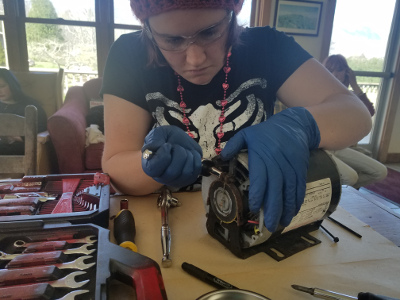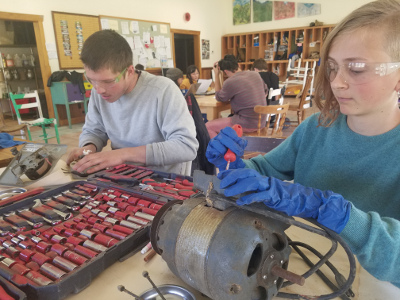Why is Shop Class Important?

Ruth and Rey were never that interested in auto mechanics. Throughout their time at Arthur Morgan School, they focused on taking different classes. Having an artistic eye, Ruth leaned toward print making, pottery, or paper making. In these course she learned important scientific concepts while also expressing herself. Rey, on the other hand, had interests in social justice. She chose courses about the civil rights movement, inspiring social change, and government. Now, as ninth graders about to leave AMS, Ruth and Rey wanted to learn about something they had never encountered before. They wanted to learn auto mechanics and how to use certain tools. They wanted shop class.
The Disappearing Shop Class
Shop classes are quickly disappearing from many school curriculums. Budget cuts and standardized testing often cause many schools to eliminate their shop classes. They see skills like wood working or auto mechanics as elective classes and cut them assuming students will pick up the skills somewhere else, but that can be a costly mistake.
Why is shop class important? Shop classes offer students the opportunity to build important life skills. They learn how to use tools and build things with their hands. They let students test their inclinations toward possible careers in engineering, carpentry, or architecture. If done in an academic setting, shop class can work alongside math, science, and history classes to bring context to real work and relevance to what the students study. Shop class shouldn’t be eliminated. It should be used more effectively.
Students Want to Learn Real Skills
This semester, students in AMS’s maintenance internship studied motion and machines that transform energy into motion. For Ruth and Rey it sounded like the perfect class, an opportunity to learn something new and practical before graduating this spring. Students at AMS get to choose their classes. At the beginning of each academic unit, teachers present their syllabus and students then choose which class they want to take. They must satisfy their academic requirements of science and social studies credit, but the topic of their courses is entirely up to them.
Learn more about AMS’s academics
Some students like to pick topics that they feel comfortable with or that interest them on deep level. That was what Ruth and Rey had done for the majority of their time at AMS. Now they wanted something different. Knowing about cars and how they worked was something they were curious about so when the opportunity provided itself, they took it.
The Science of Shop Class
In the internship, Ruth and Rey looked at bicycles and made bicycle-powered devices. They attempted to create a tandem bike by welding two bikes together. That gave them the opportunity to observe how an arc welder worked. They learned the basic principles of electricity and what caused the arc to jump and produce extreme heat.
The class then transitioned into learning about electromagnetism and electromagnetic radiation. They disassembled a motor and combustion engines and then played future archaeologist by piecing together how they work. It was a perfect example of AMS’s explorational learning model, driven entirely by student inquiry. Rey and Ruth asked questions like “What is this piece?” and “What is it used for?” The class then answered these questions by performing experiments.
Shop Class Equals Life Skills
The internship provided Ruth and Rey with an experiential understanding of various machines. They learned the scientific concepts behind motors and engines while also learning to use certain tools. They also learned how to read and comprehend diagrams and schematics. Rey describes the class as “a way of learning important skills I really wanted to know” Ruth reflects, “I am glad I took the internship. I learned a lot.”
Internships at AMS gives students the opportunity to learn new skills and delve into areas of learning that they might otherwise not try. They keep important part of education like shop class alive and relevant. For Ruth and Rey the Maintenance Internship was an opportunity to gain new skills and push themselves outside their comfort zone. When they leave AMS next month, they know they will be the better for it.
-by Nicholas Maldonado
